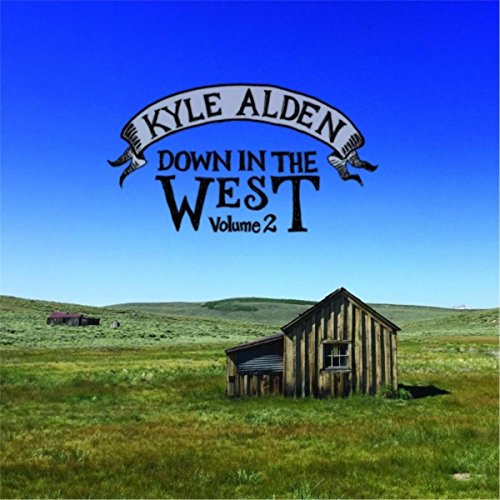|
Kyle Alden, Down in the West Volume 2 (independent, 2016) various artists, Cohorts & Collaborators (Western Jubilee, 2017) From the 1860s to the latter years of the century, cowboys -- also known as waddies, buckaroos and drovers -- established a code that governed everything from work conduct to treatment of women and horses to clothing choices. (That code was milked for comic effect more than a century later by the musical group Riders in the Sky as the "Cowboy Way.") Basic necessity, the effort to reduce the risks of the job, provided the immediate inspiration. So too, one supposes, did a kind of spiritual need, shared by all of us, to believe that what we're doing has some larger meaning. The mythologizing of cowboy life, in other words, was not entirely the creation of Eastern dime-novel writers and, in the next century, Hollywood Westerns.
Yet the romance is not all gone, not least among the surviving cowhands and ranchers (along with professional folklorists) who in 1984 met in Elko, Nevada, to form the annual Cowboy Poetry Gathering, which by affirming its old customs launched a new era in the culture of the West. One of the founders, Waddie Mitchell, was a real-life Nevada cattle-herder and ranch manager. Mitchell practices the tradition of verse recitation, a practice carried in part by persons who do not necessarily possess musical gifts, or at least don't exercise them. It has long existed -- in fact, everywhere -- alongside ballad-making and -singing. Every year since, versifiers and musicians (Ian Tyson the most famous among the latter), usually with personal ties to the rural West, come together to give voice to stories and shared values. Mitchell has also been among the most successful range poets, plying his craft around the country and the world while issuing a number of CDs. On Cohorts & Collaborators he saddles up with cowboy-culture singers and pickers who transform his verses into song. Only one cut, "Trade Off," bears Mitchell's solo byline. It's a splendid piece, I suspect based on an existing husband and wife who live and labor on the range as if it were a century ago. Performed by the Gillette Brothers, it incorporates the "Leaving of Liverpool" melody, to which no sane listener can possibly object. I'm sure, though, that Mitchell wrote of a "bright and lively" couple, not (as the Gillettes have it) a "bright and likely" one. One tends to think of cowboys, fairly or unfairly, as a hard, rough bunch with unforgiving politics to match. Mitchell's lyrics, however, are infused with compassion, addressing issues such as the futility of war, the tragedy of homelessness, and post-traumatic stress disorder. A truth-teller more than a fuzzy sentimentalist, he offers up memorably dark but sympathetic perspectives in "Back Story" (Jon Chandler), "Dogs Bark in the Night" (Pipp Gillette) and "The Bristlecone Pine" (Brenn Hill).
Kyle Alden's West is not the Rocky Mountain one, which is what most people have in mind when they think of that geographical identification, but the West Coast. It's also the West of Ireland, which informs but does not entirely define his musical approach. More usual Western themes occasionally figure in his songs, as in his evocative, self-penned "Better Than New." Down in the West Volume 2 combines original and traditional material in the way of an especially accomplished folk singer as opposed to an "Americana" artist only feigning roots. For an example of the latter,"Sam Hall," sometimes done as a darkly comic exercise, is, oddly, better known than often recorded. Back in the mid-1960s Johnny Cash covered it -- apparently learned from John Lomax's collection of cowboy songs -- on his classic The Ballads of the True West (still my favorite Cash album). Alden's version, learned from a Belfast singer, has mostly different lyrics and a sadder, more reflective melody than Cash's. By the same token the often-recorded mid-Tennessee "Sail Away Ladies" sounds not much like Uncle Dave Macon's, which shaped most subsequent performances of the tune. Alden's originals, notably "These Days" and "Child to Me" but really all of them, are affectingly and smartly crafted, as both lyrics and tunes, with echoes of older traditional music never far in the background. The album opens with W.H. Auden's famous "As I Walked Out," connected to an Alden melody that sounds as if it wafted in from one of those many folk songs that start with the same four words. If you're in the mood for a trip out West, even if you lack the time or resources, you might want to listen to these two albums. Each in its way will take you there. 
|
 Rambles.NET music review by Jerome Clark 11 March 2017 Agree? Disagree? Send us your opinions!  Click on a cover image to make a selection. 



 |


